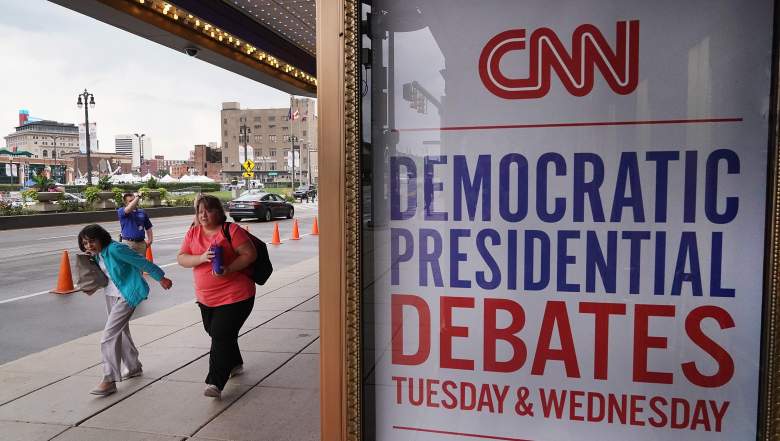
Getty
Tonight marks the end of the second round of Democratic debates. The debates are being broadcast live from Detroit, and this second night of debates will feature some highly anticipated showdowns between candidates. But just how much time do you need to put aside for the debates tonight? Here are the details you need to know.
Tonight marks the second of two back-to-back Democratic debates for the 2020 Democratic nomination for President. The debate tonight is supposed to be two hours long, beginning at 8 p.m. Eastern and ending at 10 p.m. Eastern. However, CNN has set aside three hours in case it goes long, which it looks like will happen again tonight. According to TV Guide, CNN has set aside three hours for the debate, with the broadcast ending at 11 p.m. Eastern tonight. So make sure your DVR is set for three hours, just in case. The first debate last night ended up lasting about 2 1/2 hours and ending around 10:30 p.m. Eastern.
If you’re planning to host a watch party for this debate, then you might want to budget some time for an after-show too, even if you don’t want to continue watching CNN. Many late-night shows will air live immediately after the debate, and news shows will also be providing commentary once the debate ends. Stephen Colbert’s The Late Show will air earlier than normal tonight, starting live immediately after the debate ends. The Daily Show with Trevor Noah will also air live immediately after the debate.
The lineup for tonight’s debate includes Jay Inslee, Kirsten Gillibrand, Tulsi Gabbard, Michael Bennet, Bill de Blasio, Cory Booker, Andrew Yang, Julian Castro, Kamala Harris, and Joe Biden.
How are these candidates doing in the polls so far? According to 538, a Morning Consult poll for July 22-28 placed Inslee at 0 percent, Gillibrand at 1 percent, Gabbard at 1 percent, Bennet at 1 percent, de Blasio at 1 percent, Booker at 3 percent, Yang at 2 percent, Castro at 1 percent, Harris at 12 percent, and Biden at 33 percent.
Meanwhile, a California-based Public Policy Institute poll for July 14-23 was a little different, placing Harris at 19 percent and in first place, with Biden at 11 percent.
A HarrisX poll for July 27-29 put Inslee at 0 percent, Gillibrand at 1 percent, Gabbard at 0 percent, Bennet at 1 percent, de Blasio at 1 percent, Booker at 1 percent, Yang at 1 percent, Castro at 2 percent, Harris at 7 percent, and Biden at 32 percent.
In general, among tonight’s candidates Biden is usually topping the polls, although Harris sometimes surges ahead or close by. Yang has been a surprise in the polls, sometimes gathering a respectable amount, especially for a candidate who was relatively unknown before running for President. He’s already one of the eight to qualify for the September debates in donations and polls, according to his campaign.
After this, the next debates will be in Houston in September. Depending on how many qualify, we could have one or two nights of debates. So far, seven people have qualified for the September debates. To be in the third and fourth debates in September and October, candidates must get donations from 130,000 people and get at least 2 percent in polls from four DNC-approved polls within a limited window. Some think that the field may be cut in half due to the more stringent requirements.
READ NEXT: Andrew Yang & DNC at Odds Over Qualifying Polls: He Still Needs One More for Fall Debates
